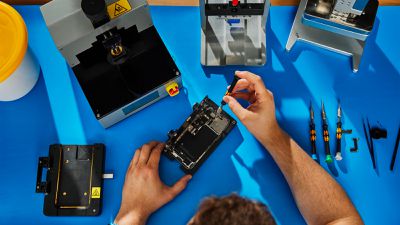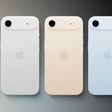iFixit Urges FTC to Establish Stronger Right to Repair Rules
Popular repair site iFixit today sent a petition to the United States Federal Trade Commission calling for new Right to Repair rules that would protect consumer interests.

iFixit's petition calls attention to some of the "blocks" that manufacturers have put in place that prevent customers and independent repair shops from repairing their electronics, such as proprietary screws or repairs that require software authentication, which is a method that Apple employs. iFixit wants the FTC to consider the following rules:
- Consumable components should be replaceable and readily available throughout a product's usable lifespan.
- Components that commonly break should be replaceable and readily available as repair parts.
- Consumers should be able to choose to take damaged products to a repair shop of their choice, or perform a repair themselves.
- When a manufacturer discontinues support for a product, its key functions should remain intact, and an independent repair shop should be able to continue to perform repairs.
- Identical components from two identical devices should be interchangeable without manufacturer intervention. (This is not the case with Apple devices).
- Independent repair shops should not be required to report customers' personally identifiable information to the manufacturer.
In France, Right to Repair laws require manufacturers to provide a device repairability score that gives context on how difficult or easy it is to repair, and iFixit says that the FTC should adopt a similar policy in the United States.
"Consider this a request for the FTC to stretch its arm out," reads iFixit's blog post on the petition. The site acknowledges that developing and enforcing any kind of rule could take years, but it is hopeful that the FTC will consider the request.
Apple in August supported California's Right to Repair law, drawing praise from iFixit, but there is no equivalent federal right to repair mandate at this time. Apple in October endorsed a push for nationwide Right to Repair law that "balances repairability with product integrity, usability, and physical safety."
Apple was supportive of California's law in particular because it requires parts to be sourced from the manufacturer, and it does not allow for parts from third-party sources. Notably, California's law does not have some of the specific provisions that iFixit is proposing, such the option to swap components from two identical devices or the option to conduct repairs without tying components to a device's IMEI.
While iFixit has lauded Apple for backing California's Right to Repair law, the site in September lowered the iPhone 14's repairability score from a 7/10 to a 4/10 because of the way that Apple ties repair components to a specific device by requiring validation.
Popular Stories
Since the iPhone X in 2017, all of Apple's highest-end iPhone models have featured either stainless steel or titanium frames, but it has now been rumored that this design decision will be coming to an end with the iPhone 17 Pro models later this year.
In a post on Chinese social media platform Weibo today, the account Instant Digital said that the iPhone 17 Pro models will have an aluminum...
Apple is continuing to refine and update iOS 26, and beta three features smaller changes than we saw in beta 2, plus further tweaks to the Liquid Glass design. Apple is gearing up for the next phase of beta testing, and the company has promised that a public beta is set to come out in July.
Transparency
In some apps like Apple Music, Podcasts, and the App Store, Apple has toned down the...
In select U.S. states, residents can add their driver's license or state ID to the Wallet app on the iPhone and Apple Watch, providing a convenient and contactless way to display proof of identity or age at select airports and businesses, and in select apps.
Unfortunately, this feature continues to roll out very slowly since it was announced in 2021, with only nine U.S. states, Puerto Rico,...
Apple will launch its new iPhone 17 series in two months, and the iPhone 17 Pro models are expected to get a new design for the rear casing and the camera area. But more significant changes to the lineup are not expected until next year, when the iPhone 18 models arrive.
If you're thinking of trading in your iPhone for this year's latest, consider the following features rumored to be coming...
Apple is expanding the ability to add an Apple Account Card to the Wallet app to more countries, according to backend Apple Pay changes.
With iOS 15.5, Apple updated the Wallet app to allow users to add an Apple Account Card, which displays the Apple credit balance associated with an Apple ID.
If you receive an Apple gift card, for example, it is added to an Apple Account that is also...
Three out of four iPhone 17 models will feature more RAM than the equivalent iPhone 16 models, according to a new leak that aligns with previous rumors.
The all-new iPhone 17 Air, the iPhone 17 Pro, and the iPhone 17 Pro Max will each be equipped with 12GB of RAM, according to Fixed Focus Digital, an account with more than two million followers on Chinese social media platform Weibo. The...
Apple should unveil the iPhone 17 series in September, and there might be one bigger difference between the Pro and Pro Max models this year.
As always, the Pro Max model will be larger than the Pro model:iPhone 17 Pro: 6.3-inch display
iPhone 17 Pro Max: 6.9-inch displayGiven the Pro Max is physically larger than the Pro, it has more internal space, allowing for a larger battery and...
The calendar has turned to July, meaning that 2025 is now more than half over. And while the summer months are often quiet for Apple, the company still has more than a dozen products coming later this year, according to rumors.
Below, we have outlined at least 15 new Apple products that are expected to launch later this year, along with key rumored features for each.
iPhone 17 Series
iPho...





















